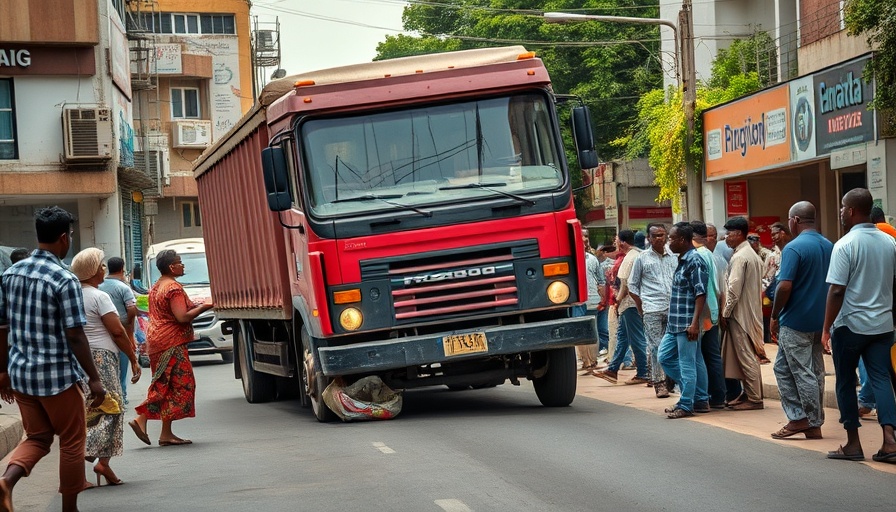
The Rising Toll of Road Accidents in Auchi: A Call for Action
Every journey comes to an end, but for many residents of Auchi, that end has been tragically premature. In just five days, two devastating accidents involving Dangote cement trucks incurred horrific consequences, leaving numerous families shattered and raising the ire of the local community. The heart-wrenching stories of victims like Ruth Utabo, a recent graduate whose life was irrevocably altered after losing a leg, and Elizabeth, a survivor confined to a hospital bed, underscore a startling reality. On August 12, 2025, a reckless driving incident resulted in Ruth’s leg being crushed, an event that catalyzed a wider conversation about safety and accountability in transportation.
In Auchi Protests Over Deadly Truck Accidents, the discussion dives into the tragic incidents that have sparked mass protests, prompting a deeper analysis of the need for improved road safety.
Shattered Lives and Community Outcry
Tragically, what followed was yet another accident on August 17th which claimed three additional lives. John Adilbe, a bystander to the disaster, recollects the fear and panic as he narrowly escaped being crushed by a careening truck. "I have been here for over 12 years. There hasn’t been a single month without an accident," he lamented. The urgency of the issue has mobilized students from Auchi Polytechnic, who have taken to the streets in peaceful protest for safer roads and tangible reforms.
Demands for Safer Infrastructure
The peaceful protests have resonated deeply within the community, with demonstrators making clear demands: safer roads, compensation for victims, and essential infrastructure improvements such as pedestrian bridges and speed bumps. Led by activist Martin Zer, aka “very dark man,” these youths have displayed remarkable bravery in blocking all Dangote trucks from entering Auchi until meaningful change is enacted. Their actions symbolize a broader demand for accountability from a company whose trucks have become synonymous with perilous driving conditions.
Government Response: Pledges vs. Action
The Edo State government's pledge to pay Elizabeth’s hospital bills and fund her impending surgery offers a flicker of hope amid the chaos. Governor Senator Mondo PBLO has shown empathy, demonstrating that even in the darkest moments, there can be light. However, this action raises critical questions: Is financial compensation adequate, or does it serve to distract from the need for systemic change? As residents reflect on these pledges, the broader institutional accountability that is desperately needed still hangs in the balance.
Community Resilience and Forward Momentum
Despite ongoing tragedies, the unwavering resolve of Auchi’s residents highlights an essential truth: their voices will not be silenced. Their advocacy for justice and a call for improved infrastructure structures the fabric of this community’s journey moving forward. The protests, though sparked by tragedy, reveal an opportunity for a concerted push towards meaningful policy change. The citizens of Auchi are not merely victims in this narrative; they are catalysts for change, compelling the government and transport companies to address longstanding issues that have been allowed to fester.
The Path Ahead: Creating Lasting Change
As discussions around road safety gain traction, this moment offers valuable insights. Local governments must prioritize investments in infrastructure while also implementing robust regulations governing vehicle safety standards and driver accountability. Furthermore, community engagement in these discussions is critical, ensuring that the perspectives and needs of those most affected by these tragedies are at the forefront of policy considerations.
Conclusion: A United Stand for Safer Roads
In the wake of heartbreaking events, the residents of Auchi have voiced their demand for safer roads and accountability, igniting discussions that could lead to transformational changes in transport policies. School students, local leaders, and the families of victims have come together to protect their community, demanding that companies like Dangote adhere to social responsibility. The plight of Auchi is a testament to the resilience of its residents. Their collective voice urges other communities across the continent facing similar challenges to reflect on the importance of safety legislation in protecting lives. Let this serve as a call to action not only for Auchi but also for nations across Africa, where road safety must be prioritized as a matter of public health and human rights.
 Add Row
Add Row  Add
Add 


Write A Comment